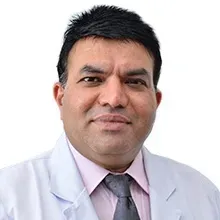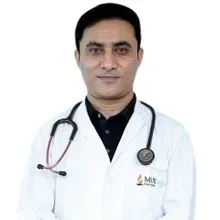Dr. Chandragouda Dodagoudar is a highly experienced and accomplished Oncologist with over two decades of dedicated service in the field. He possesses a strong academic background, having completed his MBBS from the University of Mysore and further specializing in Medicine and Medical Oncology.
Dr. Dodagoudar is renowned for his expertise in Breast Cancer Management and Treatment, offering comprehensive care to his patients. His contributions to the medical community have been recognized through various awards and accolades, reflecting his commitment to excellence. He has a patient-centric approach and extensive experience working in renowned institutions such as BLK Super Speciality Hospital, Rajiv Gandhi Cancer Hospital, and Max Healthcare. With his unparalleled cancer care, he has earned the trust and admiration of both his patients and peers.
Lymphoma : A cancer of the lymphatic system, which is part of the immune system. It can affect lymph nodes, spleen, thymus, and other lymphoid tissues.
Brain Cancer : A general term for tumors that develop in the brain or spinal cord. These can be malignant (cancerous) or benign (non-cancerous) and vary in their aggressiveness.
Congenital Neutropenia : A rare blood disorder where a person has a low number of neutrophils, a type of white blood cell that fights infections.
Colorectal or Colon Cancer : Cancer that starts in the colon or rectum, both parts of the large intestine. It's one of the most common cancers worldwide, but early detection and treatment can significantly improve outcomes.
Mixed Gliomas : Brain tumors composed of multiple types of glial cells, which are the supporting cells in the brain. The specific types of glial cells involved determine the tumor's grade and aggressiveness.
Breast Cancer : Cancer that develops in breast tissue. It's the most common cancer among women, but can also occur in men. Early detection and treatment is crucial.
Prostate Cancer : Cancer that develops in the prostate gland, a male reproductive gland. It's a common cancer in men, but often grows slowly. Treatment options depend on the stage and aggressiveness of the cancer.
Aplastic Anemia : A serious blood disorder where the bone marrow doesn't produce enough red blood cells, white blood cells, and platelets. This can lead to fatigue, increased risk of infection, and bleeding problems.
Cervical Cancer : Cancer of the cervix, the lower part of the uterus. It's often caused by the human papillomavirus (HPV) and can be prevented through vaccination and regular screenings.
Rectal Cancer : Cancer that starts in the rectum, the lower part of the large intestine near the anus. Treatment options are similar to colon cancer and depend on the stage of the disease.
Multiple Myeloma : A cancer of plasma cells, a type of white blood cell found in bone marrow. It can damage bones, kidneys, and the immune system.
Lung Cancer : The leading cause of cancer death worldwide. It starts in the lungs and can spread to other parts of the body. Smoking is the main risk factor.
Metastatic Cancer : Cancer that has spread from its original location in the body to other organs or tissues.
Pancreatic Cancer : An aggressive cancer that starts in the pancreas, an organ located behind the stomach. It's often diagnosed at a later stage when treatment options are limited.
Oligodendrogliomas : A slow-growing type of brain tumor that arises from oligodendroglial cells, which produce the myelin sheath that insulates nerves.
Oral or Mouth Cancer : Cancer that develops in any part of the mouth, including the lips, tongue, cheeks, gums, and roof of the mouth. Tobacco use and excessive alcohol consumption are major risk factors.
Sickle Cell Disease : A group of inherited blood disorders that affect the red blood cells, causing them to be sickle-shaped. This can lead to pain, fatigue, and organ damage.
Meningiomas : The most common type of primary brain tumor, arising from the meninges, the membranes that surround the brain and spinal cord. They are usually benign but can cause symptoms due to their size or location.

















